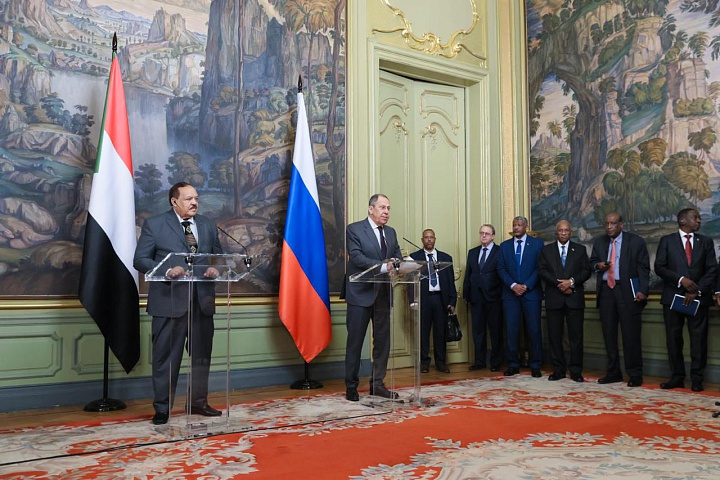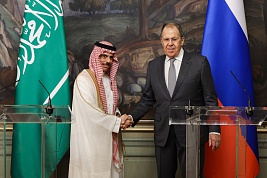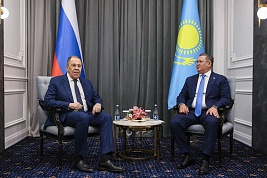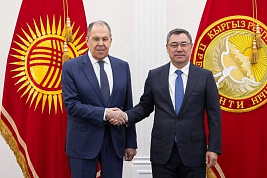Foreign Minister Sergey Lavrov’s remarks and answers to media questions at a joint news conference following talks with Foreign Minister of the Republic of the Sudan Ali Youssef Ahmed Al-Sharif, Moscow, February 12, 2025
Ladies and gentlemen,
My colleague, Foreign Minister of the Republic of the Sudan Ali Al-Sharif, and I had rewarding talks. For obvious reasons, the discussion, which was also very specific, largely focused on the situation in Sudan, where an armed conflict between regular army units and the Rapid Support Forces has been going on since April 2023. The hostilities lead to civilian casualties, destroy the country’s socioeconomic infrastructure and cause the humanitarian situation to deteriorate.
We are interested in normalising the situation in this friendly country, our good traditional partner in Africa, as soon as possible. We reaffirmed our principled position on the need for an early cessation of hostilities along with the launch of a national dialogue, which should include representatives of all political, ethnic and religious groups in Sudan. It should be aimed at achieving national accord and a speedy return to peaceful life. According to Acting Minister of Foreign Affairs Ali Al-Sharif, two days ago, the Sudanese leadership published a roadmap that should pave the way for progress in this direction.
At the same time, we condemn any outside interference in the internal affairs of the Sudan. In November 2024, Russia was forced to use its veto power to vote against a British-sponsored UN Security Council resolution on the protection of civilians in Sudan and the implementation of the inter-Sudanese agreements reached in May 2023. That draft effectively ignored the legitimate government of Sudan and its leading role in ensuring national security in accordance with international law.
We share the view that stabilising Sudan will pave the way for the further progressive development of our bilateral ties. We consider economic activities to assist Sudan in the development of the country’s mineral resources as one of the main avenues for cooperation. We have solid and mutually beneficial experience in this matter.
Regional affairs were also discussed, primarily the situation in the Palestinian-Israeli conflict zone. We are concerned about the implementation of the agreement between Israel and Hamas. The parties continue to accuse each other of violating their January 19, 2025 agreement. This is thoroughly regrettable. We are trying to prevent this through contacts with our Arab colleagues and with representatives of other countries at the UN. A final settlement of the longest-standing conflict in the Middle East is possible only through the realisation of the Palestinians’ legitimate right to establish their own state, as has been repeatedly promised to them – solemnly, officially, legally and politically.
We are interested in Syria getting on track towards national accord. This will benefit the entire region. We agreed to continue close coordination at the UN and other multilateral platforms.
I expressed our satisfaction with our Sudanese partners’ balanced and constructive stance on the situation in and around Ukraine. We appreciate it when their principled approach is translated into voting on relevant resolutions at the UN General Assembly.
I would like to thank my colleague for the candid conversation. We agreed to further pursue the ongoing efforts to promote normalisation in Sudan and creating additional opportunities for the expansion of our bilateral partnership.
Question: How do Western sanctions affect Russia’s ability to expand its influence in Africa, particularly in Sudan?
Sergey Lavrov: In the current context, Western sanctions do not promote the development of global trade and economic relations. They adversely affect even the nations imposing them. Consider expert commentaries on US President Donald Trump’s decision to implement 25 percent tariffs on steel and aluminium for all countries exporting these goods to the United States. It has already been calculated that this measure will have a material adverse effect on the economy of the country resorting to these actions. The same can be stated about the sanctions proudly proclaimed by the European Union against Russia, with the 16th package currently in preparation. The economic results are dismal. The cost of Russian gas and other energy resources, which for many decades, due to their affordability, ensured economic growth primarily in Germany and other leading EU nations, as well as across the entire united Europe, has soared.
In terms of the impact of sanctions on our partnership with African countries, the initial observation is that sanctions reveal the unreliability of those who impose them and their willingness to undermine all the principles of globalisation they once advocated: fair competition, the presumption of innocence, the sanctity of property, the free play of market forces, etc. All of this has been obliterated in an instant.
In most instances, we endeavour to seek and establish opportunities for continued constructive cooperation with countries in Africa and other continents, independent of the unlawful, unilateral and illegitimate actions of the collective West.
I reiterate: there are ways. They are quite effective. However, in the long term, this raises fundamental questions about how to further develop the global economy – with the West, or whether it is preferable to do so without it, or at least to have contingency schemes for banking operations, logistics, insurance, etc.?
The inconsistency of this group of countries in upholding the global economic system they themselves built over many decades has now become evident to all. It seems improbable that any new traditional currencies will appear. Instead, digital currencies, along with supply chains and banking settlements, are poised to gain prominence.
In practical terms, we, alongside our African partners, are identifying opportunities to enhance trade, which continues to flourish. This growth extends to investments as well. Strategically, I am observing trends in the global economy, such as globalization. Although the West once advised and even imposed globalization on others, it has now been undermined by its own actions.
Question: Russia has released American citizen Marc Fogel. Under what conditions was this done? What did Moscow gain as part of the deal with Washington?
Sergey Lavrov: The question is straightforward. As you understand, diplomatic contacts prefer silence. In recent weeks, numerous questions have been posed at various levels, including to Presidential Press Secretary Dmitry Peskov. He provided as much information as could be shared: that discussions are ongoing.
Our American counterparts opted to publicise the outcome. We have a different stance regarding the agreements that have been reached. This is the result of one of the channels through which these communications occur.
I would like to highlight that for diplomacy to be effective, we prefer to maintain the confidentiality of agreements.
Question: The world is anticipating a potential meeting between President Vladimir Putin and President Donald Trump. In your opinion, could this meeting facilitate an improvement in bilateral relations and pave the way for an agreement on resolving the Ukrainian crisis?
Sergey Lavrov: Is it indeed the entire world that is waiting? It seems to me that not everyone is.
There are those who argue that any engagement between Moscow and Washington may impinge upon their interests. Europe, through the voice of Kaja Kallas, who succeeded Josep Borrell as the High Representative of the EU for Foreign Affairs and Security Policy, has begun to assert that no discussion can take place without European involvement. However, they appear to have realised the diminished position they occupy in the global hierarchy, and ascending from there will not be straightforward.
In response to the direct question about potential talks, President Donald Trump has repeatedly stated that he is prepared and willing to call and ready to meet in person. President Vladimir Putin, when asked about his stance on such declarations by the American leader, stated that he is equally prepared for this engagement. The presidents themselves will make the final decision. I have no doubt that the pertinent information will be disclosed in due course.





